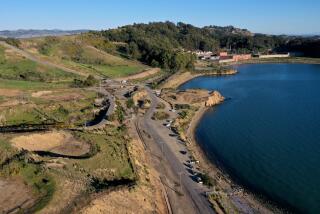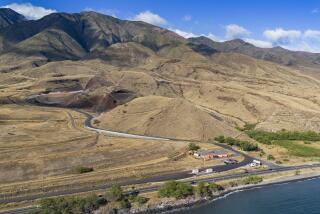Backcountry Rallies Against Waste Plan : Environment: Hundreds from southeast San Diego County voice concerns at public hearings over proposed hazardous waste plant at La Posta Indian reservation.
A year ago, Carlos Nava bought 5 acres in Boulevard in the hope that its pristine air would soothe his failing lungs. Now, the disabled retiree is adding his halting voice to the outcry against a proposed hazardous waste incinerator in southeast San Diego County.
“I feel a duty to bring my lungs and my voice as testimony to what chemicals can do,” Nava said softly Monday night, his words punctuated by sharp gasps. At a public meeting in Pine Valley to discuss the proposed waste facility on the La Posta Indian reservation, Nava told how his lungs were damaged when a crop duster sprayed him with pesticides.
“It’s too late for my lungs,” he told a hushed crowd of about 400. “But for you, now is the time to fight. There can be no chemical accidents if there are no chemicals around.”
On Tuesday, at a second public meeting in Alpine, Gloria Clark echoed Nava’s words.
“We have sat back for many years,” Clark, a local landowner who suffers from asthma, told the 75 people who gathered to express their views. “Now it’s time for grandmothers like me to speak out.”
Officially, the two public hearings the federal government held Monday and Tuesday were merely “scoping meetings”--the first in a series of steps to determine the environmental feasibility of a hazardous waste recycling and incinerating station that three companies are seeking to build on Indian land.
But to listen to most of the ranchers and farmers, Indians, lawyers, scientists and housewives who spoke their minds at the two sessions, it sounded more like a call to arms--not just for backcountry residents, but for all San Diego County dwellers.
“They come out here thinking they’re going to have an easy fight, assuming everybody back here is backwoods,” said Frank Santana, one of many speakers who aimed comments at the boisterous crowd, not at the federal officials and project spokesmen present. “We’re backwoods, but we’re not back wards .”
“You want to fight? Damn it, fight! Fight for what you believe in,” urged Sandy Sterling, a Lakeside woman who held the microphone in one hand and a placard in the other: “Boulevard Wants to Nuke Toxic Waste Plant.”
For Donna Tisdale, a Boulevard ranch owner who mailed out flyers to increase community awareness about the meetings, the turnout was gratifying--as was the anger that shone in many speakers’ voices.
Sixteen months ago, Tisdale helped found Back Country Against the Dump to fight another proposed waste facility on the nearby Campo Indian Reservation. Now that two other San Diego County Indian reservations, La Posta and Los Coyotes, have entered into similar agreements with waste companies, Tisdale says her group, known as BAD, is gaining momentum.
“As long as the industry has an Indian reservation, a barrio or some rural community to hide this stuff, and as long as they have somebody who doesn’t know the danger of it, they won’t have to deal with it,” said Tisdale, whose BAD cohorts wore caps identifying them as “Good Guys” at Monday’s 3 1/2-hour meeting. “So we have expanded our fight to protect the backcountry.”
From the sound of it, BAD gained more than a few recruits Monday and Tuesday. Concerned about their well water, their property values and their children’s health, many area residents said they will fight to keep the $35-million facility out of their area. Several backed up their claims by dropping $5 bills into BAD’s donation box.
The fight to stop the La Posta waste facility won’t be an easy one, Tisdale says. In part, Indian reservations are attractive to waste management companies because they are exempt from state and local environmental laws and from some types of federal oversight. Although the La Posta band must get approval from the U.S. Bureau of Indian Affairs to operate a landfill or incinerator, it is not bound by county guidelines, such as the San Diego County Hazardous Waste Management Plan.
If they were, many people pointed out at the scoping meetings, the La Posta project would have to be scrapped because ground-water-dependent communities are specifically protected by the county plan, which prohibits hazardous waste treatment facilities within ground-water drainage basins in areas where such communities exist.
But the Indian reservations, however tiny, are considered sovereign nations. As such, they impose their own laws.
On Tuesday, Margaret Benjamin, a Las Viejas Indian, was one of a few people who defended the Indians’ right to decide their own fates--and to thus alleviate the crippling poverty that exists on many reservations.
“You people take it upon yourselves to take it personally,” she said of the Indians’ decision. “And you don’t think about our children.”
But other speakers appealed directly to Frank La Chappa, the business manager of the La Posta Indian tribe, saying that no amount of money is worth risking environmental damage.
“Your people love the land,” she said. “Don’t turn your back on them, or your million bucks won’t be worth (anything).”
La Chappa said later, “We’re going to build off of these (suggestions) and make it a safe facility. If the public gives good input, we’ll have a safer facility.”
Don Floyd was among many who noted that the backcountry’s high winds might mean trouble for the incinerator’s towering smokestack.
“I want to know how much the 80-foot stack costs . . . so when it blows on my property I know how much to charge ‘em,” he said, prompting laughter from the crowd. Then he made this promise: “If this project goes in, and my well water is contaminated, any person who had anything to do with approving it . . . will drink a substantial amount of my water.”
Frankie Reed, an organic farmer who lives in Lake Morena, spoke more gravely. If the air and water became contaminated by the proposed facility, she predicted, the damage will not be limited to the immediate area.
“Water runs downhill,” she said. “San Diego’s going to get it, too--not just us.”
Times staff writer Monica Rodriguez contributed to this article.
More to Read
Sign up for Essential California
The most important California stories and recommendations in your inbox every morning.
You may occasionally receive promotional content from the Los Angeles Times.










